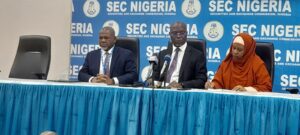The Securities and Exchange Commission (SEC) on Wednesday vowed to ensure the settlement of unclaimed dividends, which stood at N215 billion as at March.
Dr Emomotimi Agama, Director-General, SEC, said this at a news conference to highlight the outcome of the second Capital Market Committee (CMC) meeting held in Lagos.
Agama, who is also the Chairman of CMC, noted that the commission had put in place mechanisms to ensure that the unclaimed dividends were cleared.
He stated that the amount of the unclaimed dividends was not rising, but adding up every quarter because they were yet to be claimed.
“These dividends would continue to add up because as at December the dividends were not claimed, and in March, a new dividend was declared and would be added to the one not claimed.
“Hence, it appears as if the unclaimed dividend is rising, but it is still the same thing and not until they are claimed, it will continue to add up,” he said.
According to him, the update on e-dividend and direct cash settlement implementation revealed progress in Application Programming Interface(API) integration among registrars, with four already actively integrated and two nearing completion.
The SEC boss revealed that seven registrars were yet to start the process, and this raised concerns about their capabilities.
Regarding the payment of outstanding dividends for mandated accounts, Agama said that compliance remained significantly low.
He explained that issues such as failed payments, dormant or closed accounts, and insufficient funding by public companies after reaching the 90 per cent return threshold had been identified as contributing factors.
Agama assured that SEC was collaborating with stakeholders to reduce the volume of unclaimed dividends in the country and report progress to the Senate Committee within the next six months.
Agama said that the commission had launched a new portal that offers self-service to the public and enabled them to o check and process their unclaimed dividends.
The director- general added that the regulator was also working toward creating an application on Google Playstore for investors to download, access, and claim their dividends.
He highlighted significant developments in the Nigerian capital market for 2024, adding that in the primary market, the commission had so far approved nine new issuances totalling N1.228 trillion and reflecting increased confidence in the market.
In the fund management space, Agama confirmed that the Net Asset Value (NAV) of Registered Mutual Funds grew by 111.08 per cent to N3.335 trillion, indicating strong and sustainable growth.
The DG expressed the determination of the commission to continue to encourage companies to list while urging Exchanges to take steps to attract new listings to align with the government’s one trillion dollar economy target.
He said the listing of more companies on the Exchanges would improve market making and liquidity.
Agama noted that the commission is ready to continue to promote capacity building on derivatives both for market operators and regulators.
He also expressed optimism about unlocking the full potential of the capital market, in alignment with the Renewed Hope Agenda of the President Bola Tinubu’s led administration.
The SEC boss said the commission plans to restructure the CMC to optimise its role in driving market efficiency and transparency, growth, and development, and unlocking its full potential to better serve the needs of our economy.
He noted that SEC had, over time, demonstrated its commitment to protecting investors, as evidenced by the recent conviction of a Ponzi scheme operator, reinforcing its stance against market offenders.
This, he noted, was a strong statement on the commission’s unrelenting efforts at combating Ponzi schemes.
In terms of the registration of market players, Agama hinted that the bulk of Capital Market Operators (CMOs) and sponsored individual applications that were pending before the coming of the new management had all been processed and concluded as appropriate.
He added that the SEC has also improved complaints management through the implementation of the Complaints Management Framework and the establishment of an Investor Protection Fund to restore investor confidence.
To manage systemic risks, Agama mentioned that SEC had mandated CMOs to prepare and submit their enterprise risk management frameworks and annual risk profiles to the commission.
He charged the CMOs to ensure compliance with the Nigerian Sanctions Alert System and to enhance reporting on Politically Exposed Persons (PEPs) and Suspicious Transaction Reports (STRs).
In efforts to assist Nigeria in exiting the FATF grey list, the director general disclosed that the commission is collaborating with other financial sector regulators and agencies.
Agama noted that the fight against cybersecurity remains a priority, with the Nigerian government implementing policies and establishing a cybersecurity committee within the capital market to manage and disseminate critical information.
According to him, these initiatives underscore the SEC’s commitment to fostering a secure and robust capital market environment in Nigeria.
The meeting featured a comprehensive overview of key developments that have shaped the capital market in the past quarter.
Members deliberated on updates presented and were informed of crucial developments by representatives of market infrastructure, technical committees, and observer groups.
The observers included sister regulatory agencies such as the Central Bank of Nigeria (CBN) and the National Pension Commission (PENCOM), among others

